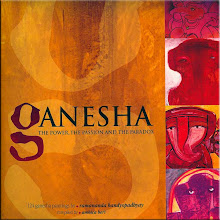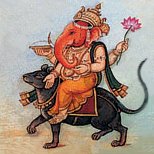One of the Sanskrit names of Shri Ganesha is Bijapuraphalasakta; literally: "fond of the many-seeded fruit". The Bijapuraphala is the pomegranate.
Since ancient times this fruit, which originated in Eastern Iran, has been associated with fertility and abundance because of its many seeds.
In Greece there is a tradition of bringing a pomegranate as a gift when visiting people who have moved into a new home. The pomegranate is placed as an offering near the Greek Orthodox icons in the house to invoke blessings from the Divine for the new occupants. Pomegranates are also broken on the ground by the Greeks as an offering to bring luck at a marriage celebration.
The fruit appears in many depictions of the Virgin Mary and Jesus as a symbol of their sacrifice, which has given abundance to mankind.
In recent times the fruit has become a kind of superfood, with many health benefits claimed for it. Pomegranate juice is proliferating on supermarket shelves, and it is almost seen as a fountain of youth.
In Indian traditional medicine (Ayurveda), all parts of the fruit and tree are used to treat various diseases.
In Indian traditional medicine (Ayurveda), all parts of the fruit and tree are used to treat various diseases.
Infant Jesus with pomegranate, Sandro Botticelli.













No comments:
Post a Comment